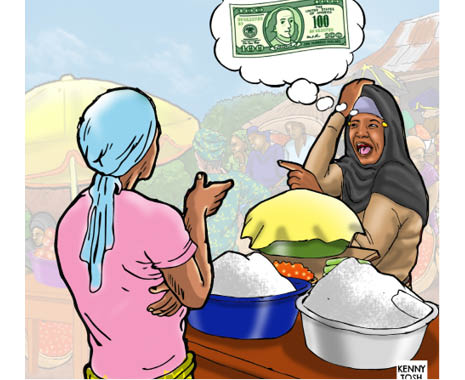Ever since the announcement on May 29, 2023 of the total withdrawal of the subsidy on petroleum products triggered a record-high inflation regime in the country, life has not been easy for most Nigerians. It has been hardship, hardship, and hardship. The situation further worsened when the naira depreciated to a record-time low; exchanging at an inflated rate of N1,800 to $1.
As the naira continued to fall freely, prices of products continued to rise including those of commodities that are fully locally produced; lacking any correlation with the exchange rate of the naira to the US dollar. One could understand if the skyrocketed prices were for items which production or manufacture required the use of petroleum products. Comments would also have reserved if the inflation were limited to imported goods. A situation where the pop-corn seller, boiled groundnut vendor, roasted corn seller, fresh okro and tomato seller, sugarcane retailer, and even ‘fura da nono’ hawker each attributes their new price tags to the exchange rate of the naira to the US dollar is extremely ridiculous.
Even the value of the minimum amount of the money payable as dowry in Islam was affected. The minimum value of dowry in naira, which before the exchange rate crisis was less than thirty thousand naira rose, at a point, to over a hundred thousand. While the abolition of oil subsidy and the exchange rate watershed both account for the inflation regime in the country, two things did not witness price hike; one secular (or material) and the other spiritual. We shall discuss this after a few paragraphs.
Sometime in February this year, the human rights activist, Femi Falana (SAN), had to sue the Price Control Board and the Attorney-General of the Federation for failing to enforce the law on price control. Delivering judgment in the case, Justice Ambrose Lewis-Allagoa of the Federal High Court in Lagos ordered the government to within seven days fix the price of milk, flour, salt, sugar, matches, bicycles and their spare parts, motorcycles and their spare parts, among others. Whether or not the order of the judge was complied with is a question for the respondents to answer.
While the Central Bank of Nigeria would claim much credit for the now enhanced value of the naira, men of God believe the divine intervention which came faster than many Nigerians anticipated is Allah’s response to the cries of citizens during the last holy seasons of Lent and Ramadan. But, in spite of the appreciated value of the naira, recent reports in the media indicate that prices of commodities are still high. Like the proverbial dog in Hausa language, Nigerians are saying nothing has changed in the prices of goods and services in the country. In the popular Hausa adage, the dog says “I’ve not seen anything on the ground” in response to those who said “There’s a ceremony in the (dog’s) house.” That’s why Nigerians, in the same wise, are saying “We are yet to see that naira gain.”
The culture of inflation in Nigeria is a unique one. When prices of commodities go up in other climes where economic indices are constantly put under check, they eventually come down. But in Nigeria, prices hardly come down once they go up. They remain up, never to come down again. With a tin of peak milk now selling at N2,000 only, Oga Falana may have to follow up with the court on the judgement he secured on this matter.
Now, what are those two things that never had their prices inflated? The first, which is material, is workers’ salary. While the figures paid to workers as salaries remained unchanged, the value of the ‘take-home’ pay continued to depreciate more often than imagined. One wonders if the hugely devalued monthly pay of workers now take them to the next bus stop from their offices.
The second, which is where human hypocrisy in the dollar factor lies, has to do with how we rate our Imams, and by extension, how we appreciate Allah, our creator. With the inflationary trend occasioned by the free fall of the naira impacting on all goods and services, I find it ridiculous that the amount of the money people offer as charity (Sadaqah) to Imams at religious gatherings (naming and wedding fatihas) to request for specific prayers in matters that give them some concern still remains as paltry as it has always been. The practice of giving an Imam money for specific prayers at a Muslim congregation is a popular routine in Nupe communities of Nigeria. The Hausa refer to such monetary offers as ‘bakin alkalami.’
At one of such recent gatherings, someone offered N40 to the Imam to ask Allah to send more customers to his shop. Another gave N50 for the Imam to pray to Allah to grant him a child. Someone also offered N20 to help him pray against the incursion of bandits and kidnappers into their community. While the lowest offer came from the person who wanted the Imam to ask to forgive all his sins, the highest offer came from the person who gave N100 and requested the Imam to ask Allah to actualize his marriage to his fiancé and as quickly as possible. The question is why has oil subsidy removal and the exchange rate crisis not impacted on ‘bakin alkalami?
To ask further in a lighter mood, is it because the Imams do not protest or because they have no trade union that people take them for granted? Why has everyone exempted Sadaqa for the Imams from being part of the dollar factor? The same people that pay a monthly levy of N10,000 to vigilantes to watch over their neighbourhood at night, offer the Imam just N20 for prayers against bandits. They pay a consultancy fee of a hundred thousand naira or more to see a fertility consultant, but choose to give N100 to the Imam whose prayer could be more efficacious than the clinical trials of a reproductive health consultant.
Of course, it’s not the amount of money given as Sadaqah that matters. Yet, it suggests an individual’s rating of those he believes have some spiritual bond with Allah. It’s also an expression of a lowly awe for Allah, the Omnipotent, who instructed believers to call Him over their needs with a promise that He would be there to grant their requests. May Allah inspire us to do that which is right at the right time and in the right place, amin.

 Join Daily Trust WhatsApp Community For Quick Access To News and Happenings Around You.
Join Daily Trust WhatsApp Community For Quick Access To News and Happenings Around You.


